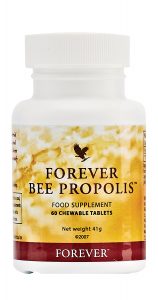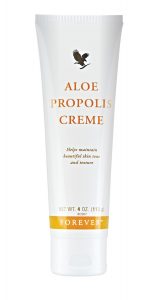What is Bee Propolis?
Did you know that honey isn’t the only thing that bees make? Bees also produce a compound called propolis from the sap on needle-leaved trees or evergreens. When they combine the sap with their own discharges and beeswax, they create a sticky, greenish-brown product used as a coating to build their hives. This is propolis.
Thousands of years ago, ancient civilizations used propolis for its medicinal properties. Greeks used it to treat abscesses. Assyrians put it on wounds and tumors to fight infection and help the healing process. Egyptians used it to embalm mummies.
The composition of propolis can vary depending on the location of the bees and what trees and flowers they have access to. For example, propolis from Europe won’t have the same chemical makeup as propolis from Brazil. This can make it difficult for researchers to come to general conclusions about its health benefits.
Healing compounds in propolis
Researchers have identified more than 300 compounds in propolis. The majority of these compounds are forms of polyphenols. Polyphenols are antioxidants that fight disease and damage in the body.
Specifically, propolis contains the polyphenols called flavonoids. Flavonoids are produced in plants as a form of protection. They’re commonly found in foods thought to have antioxidant properties, including
fruits
green tea
vegetables
red wine

What the research says
Propolis is thought to have antibacterial, antiviral, antifungal, and anti-inflammatory properties. But scientific research on propolis is limited. Researchers aren’t exactly sure why, but the bee product appears to provide protection from some bacteria, viruses, and fungi.
Wounds
Propolis has a special compound called pinocembrin, a flavonoid that acts as an antifungal. These anti-inflammatory and antimicrobial properties make propolis helpful in wound healing. One study found that propolis can help people who have had traumatic burns heal faster by speeding up new healthy cell growth.
Another study found that a topical propolis alcoholic extract was more effective than a steroid cream in reducing mast cells in oral surgery wounds. Mast cells are associated with inflammation and slowed wound healing.
Cold sores and genital herpes
Ointments that contain 3 percent propolis, such as Herstat or Coldsore-FX, may help speed healing time and reduce symptoms in both cold sores and sores from genital herpes.
One study found when topical propolis was applied three times a day, it helped to heal cold sores faster than no treatment. The researchers found the propolis cream not only reduced the amount of herpes virus present in a person’s body, but also protected the body against future cold sore breakouts.
Cancer
Propolis has been suggested to have a role in treating certain cancers as well. According to one study, some of the anti-cancerous effects of the substance include:
keeping cancerous cells from multiplying
reducing the likelihood cells will become cancerous
blocking pathways that keep cancer cells from signaling to each other
The study also suggested that propolis could be a complementary therapy — but not a sole treatment — for cancer. Another study found that taking Chinese propolis could be a helpful complementary therapy in treating breast cancer due to its anti-tumor effects on breast cancer cells.
Safety concerns
There is not yet enough evidence to determine whether or not propolis products are safe, but they’re not considered high-risk. People typically take in some propolis when they eat honey. However, if you have an allergy to honey or bees, you will also have a reaction to products containing propolis. Propolis may also cause its own allergic reaction when used for a long time.
Beekeepers are some of the people most likely to have a propolis allergy because they’re around the compound so much. The typical allergic reaction is an eczema-like skin breakout. Talk to your doctor before adding propolis to your treatment plan, especially if you have existing allergies or asthma.
A rich, creamy blend of aloe vera, bee propolis and camomile that helps maintain healthy, beautiful skin tone and texture. The Aloe Propolis Creme’s moisturising and conditioning properties make for an excellent everyday moisturiser and helps to soothe irritation. N.B. Suitable for people prone to dry skin conditions. Contains lanolin.

Weight: 113g
Ingredients
Aloe Barbadensis Leaf Juice, Glyceryl Stearate, Propylene Glycol, Cetyl Alcohol, Lanolin, PEG-100 Stearate, Propolis Extract, Chamomilla Recutita Flower Extract, Ethylhexyl Palmitate, Ethylhexyl, Stearate, Diethylhexyl Adipate, Sorbitol, Lanolin Alcohol, Dimethicone, Tocopherol, Glycine Soja Oil, Beta-Carotene, Zea Mays Oil, Allantoin, Triethanolamine, Ascorbic Acid, Disodium EDTA, Citric Acid, Parfum, Coumarin, Potassium Sorbate, Sodium Benzoate, Diazolidinyl Urea, Methylparaben, Propylparaben
